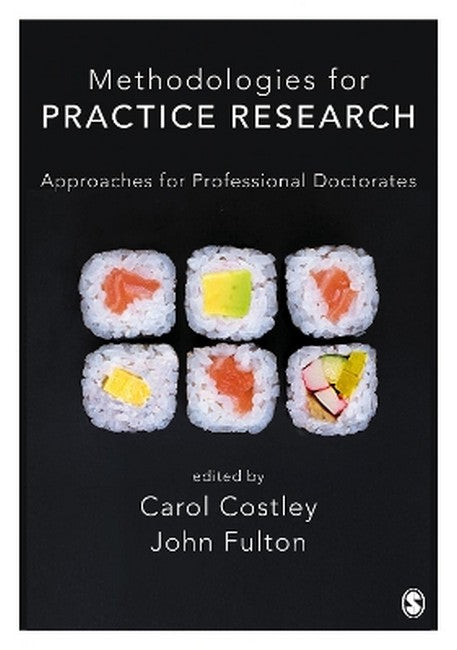Dr. John Fulton is reader in Practice-Based Research within the Faculty of Health Sciences and wellbeing. He has a career of more than 25 years in the education of health professionals. He has an interest in work-based learning and methodological approaches which shape and direct the development of practice. He is co-author of a textbook on the professional doctorate and leads the research methods module of the professional doctorate program. He is also the program leader for the MSc in Public Health and as such is/has been involved in a number of research projects in public health, with particular focus on the wider determinates of health both nationally and globally.
Request Academic Copy
Please copy the ISBN for submitting review copy form
Description
Introduction - Carol Costley and John Fulton Part I: Underlying Principles Chapter 1: Philosophy and Practice - why does this matter? - Tom Maxwell Key definitions Modes 1 and 2 knowledge production An important philosophical thread Implications Conclusion Chapter 2: Research Approaches in Professional Doctorates; notes on an epistemology of practice - Carol Costley Introduction Different forms of knowledge have led to epistemic changes The modern application of practice-based research approaches Towards an epistemology of practice Chapter 3: Why Policy Matters Particularly in Professional Doctorates - Pam Burnard, Tatjana Dragovic, Rebecca Heaton and Barry Rogers Introduction The imperative of why policy matters to the researching professional On setting parameters that lead to policy analysis and change So, how should researching professionals go about policy analysis? Methodologies for connecting professional doctorates and policy/ies Driving professional and wider changes in society: doing the doctorate differently Conclusion - So what for professional doctorate education? Chapter 4: Reflective Models and Frameworks in Practice - Jan Fook Introduction Reflection and its relationship to research The concept of reflection and related concepts Reflection and reflexivity An integrated understanding and practical model of critical reflection Reflection and practice-based research Different ways in which reflection can be used in research Issues for further discussion Criteria for making decisions about how to use reflection in research Chapter 5: Ethics - John Fulton and Carol Costley A Brief History of Ethics and Philosophical Principles Translating the principles into the research design Practice-based Research Issues to consider in Practice-based Research Part II: Methodological Frameworks Chapter 6: Methodology as Personal and Professional Integrity: Research Designing for Practitioner Doctorates - Kate Maguire Introduction The context Personal and Professional Integrity Disentangling paradigms, methodologies, approaches and methods Knowledge The simplicity of an approach Beginning research designing: conceptualising your practice in order to conceptualise and theorise practice Forms of conceptualisation Transparency Research designing: influences to consider Your design Help with clarifying an attitude to the workworld to achieve what matters Embracing Complexity Chapter 7: Alternative Dissertation Models: The Development of Modern Capstone Design - Valerie A. Storey Setting the Stage What Characterises a PD Dissertation? Extending the Dissertation Spectrum The Challenge: Alternative Dissertation Formats The Carnegie Project on the Education Doctorate (CPED) Alternative Models: Active Ingredients Conclusion and Recommendations Chapter 8: Auto-Ethnography - Kath Woodward Range and Scope of Auto-ethnography Auto-ethnography Theories, Methodologies and Methods Chapter 9: Action Research - Gill Coleman Introduction Insider Researchers Characteristics An "extended" epistemology First, Second and Third-person Action Research Putting it into practice Quality/Validity Conclusion: challenges and strengths Chapter 10: Case Study - Catherine Hayes Introduction What is the philosophical stance? What is the extent and range of the case study? Using Case Study Research in the Context of a Professional Doctorate Theory Building with Case Study Research Data Chapter 11: Mixed Methods - David Plowright Introduction The Challenge Mixed Methods Research The FraIM: A Brief Description Warrantability of Research Integrated Matrix Finally Chapter 12: Translational Research in Practice Development - John Fulton Types of knowledge How do you know that research can be applied to practice? Roles in Translational Research The Process of Translational Research Conclusion Chapter 13: Theory of Change: The Real Thing and How to Design Successful Social Change Projects - Helene Clark Basic Components of a Theory of Change Basic Definition of Theory of Change Theory: Each Component Defined Three Basic Purposes and Times for Theory of Change Using A Theory of Change in Practice Snapshot of the Process of Creating a Theory of Change Tips on Success in Creating a Theory of Change Conclusion
Costley and Fulton provide a must read for anyone involved with professional doctorates. This book supports researchers to understand and promote the importance of practice research, conduct it and create real research and policy impact. The book we've been looking for! -- Tracey Wond This is an inspiring, welcome, and long overdue text that details the multiple dimensions and unique merits of professional doctorates (PDs) and how they can be distinguished from traditional PhDs. The chapters provide a detailed guide for PD students and faculty advisors. It is also useful as a framework for designing PD programs. -- Shauna Butterwick With carefully crafted content exploring what it means to be a researching professional, Methodologies for Practice Research is a must-read text for anyone involved in designing, developing, delivering, and assessing professional practice doctoral programs. Finally, a book that will help free the professional practice doctoral dissertation from the PhD straitjacket. -- Nancy Fichtman Dana Methodologies for Practice Research is a game-changer for researchers across the professions. By naming essential methodologies, addressing the rigor, and illuminating the messiness but critical importance of this scholarship, this must-read book will change how current and future scholarly practitioners think about and conduct practice-based research. -- Rebecca West Burns

